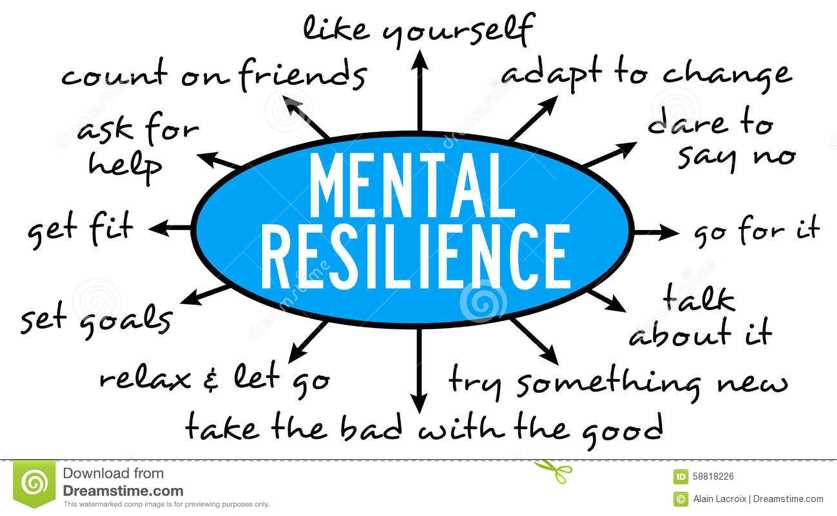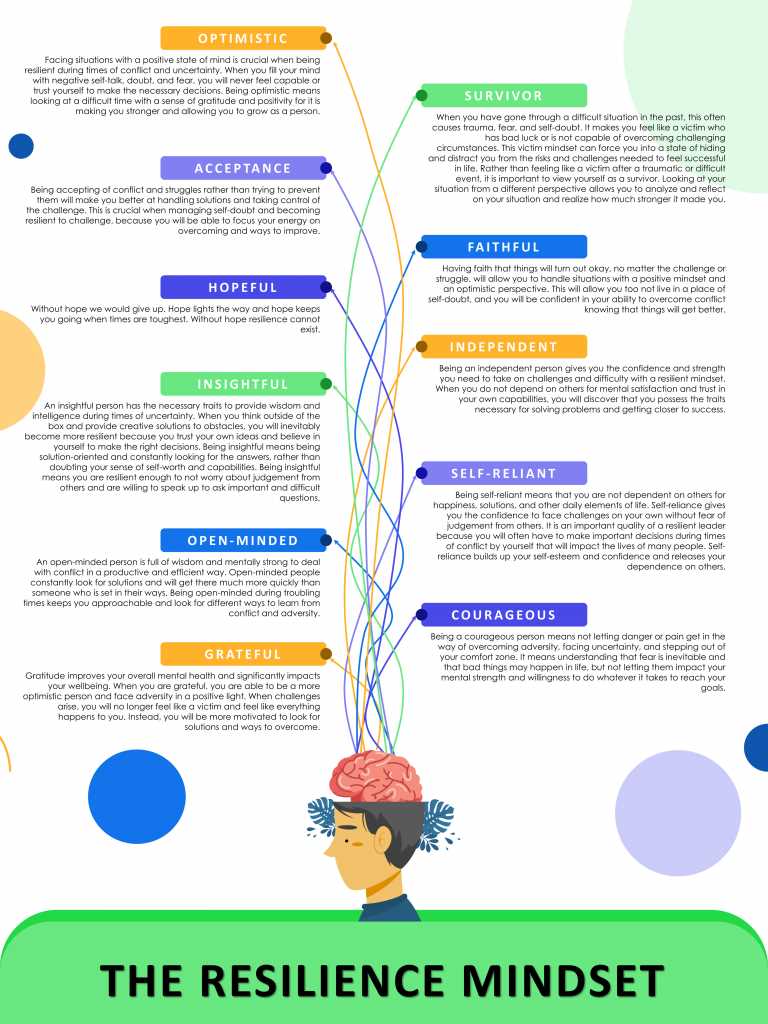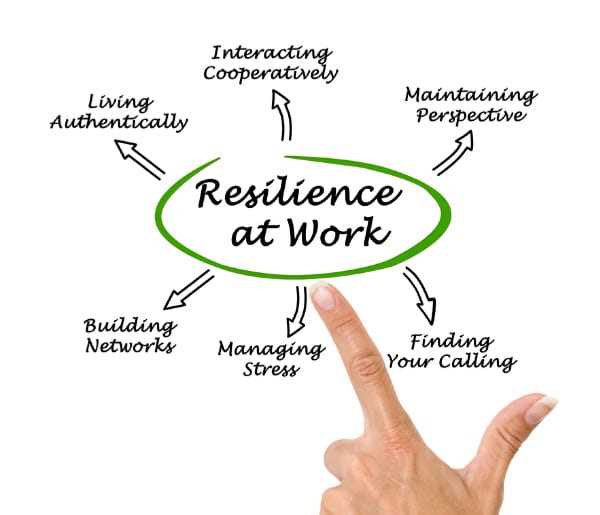
Resilience is the ability to bounce back from difficult situations and adapt to change. It is an essential skill that can help us navigate through life’s challenges and come out stronger on the other side. Building resilience takes time and effort, but with the right techniques and strategies, it is possible to develop this important skill.
Here are 10 tips to help you build resilience:
1. Practice self-care: Taking care of yourself is crucial for building resilience. Make sure to prioritize your physical and mental well-being by getting enough sleep, eating a balanced diet, and engaging in activities that bring you joy and relaxation.
2. Cultivate a positive mindset: Resilient individuals have a positive outlook on life and believe in their ability to overcome challenges. Practice gratitude, affirmations, and positive self-talk to shift your mindset and build resilience.
3. Seek support: Building resilience is not a solo journey. Reach out to friends, family, or a support group to share your challenges and seek guidance. Surrounding yourself with a strong support system can provide the encouragement and strength you need to overcome difficulties.
4. Set realistic goals: Break down your challenges into smaller, manageable goals. By setting realistic goals, you can build resilience by celebrating each small victory along the way.
5. Embrace failure: Failure is a natural part of life and an opportunity for growth. Instead of viewing failure as a setback, see it as a chance to learn and improve. Embracing failure can help you build resilience and develop problem-solving skills.
6. Practice mindfulness: Mindfulness is the practice of being fully present in the moment and non-judgmentally observing your thoughts and emotions. By practicing mindfulness, you can build resilience by developing a greater awareness of your inner strength and resources.
7. Develop problem-solving skills: Resilient individuals are able to identify problems and find effective solutions. Take the time to develop your problem-solving skills by brainstorming different solutions, analyzing the pros and cons, and making informed decisions.
8. Maintain a sense of humor: Laughter can be a powerful tool for building resilience. Find ways to inject humor into your life, even in the face of challenges. A good laugh can help you gain perspective and reduce stress.
9. Practice self-compassion: Treat yourself with kindness and understanding, especially during difficult times. Practice self-compassion by acknowledging your emotions, accepting your imperfections, and offering yourself words of encouragement and support.
10. Learn from past experiences: Reflect on past challenges and how you overcame them. By learning from your past experiences, you can build resilience by recognizing your own strength and resilience.
Building resilience is a lifelong journey, but by implementing these strategies and techniques, you can develop the skills needed to overcome challenges and thrive in the face of adversity.
Embrace Change and Adaptability
Resilience is the ability to bounce back from challenges and setbacks, and one of the key techniques for building resilience is to embrace change and adaptability. In a rapidly changing world, being able to adapt to new situations and circumstances is essential for success.
There are several skills and tools that can help you build your adaptability:
- Flexibility: Being open to new ideas and willing to change your plans when necessary.
- Problem-solving: Developing critical thinking skills to find solutions to unexpected challenges.
- Resourcefulness: Making the most of the resources available to you, even in difficult circumstances.
- Resilient mindset: Cultivating a positive attitude and the belief that you can overcome obstacles.
Here are some tips for embracing change and building your adaptability:
- Embrace discomfort: Change can be uncomfortable, but by embracing it and stepping out of your comfort zone, you can grow and learn.
- Stay curious: Be open to learning new things and seeking out different perspectives.
- Practice mindfulness: Being present and aware of your thoughts and emotions can help you navigate change more effectively.
- Build a support network: Surround yourself with people who support and encourage your growth and resilience.
- Take small steps: Break down big changes into smaller, manageable tasks to make them less overwhelming.
By embracing change and building your adaptability, you can develop the resilience needed to overcome challenges and thrive in an ever-changing world.
Developing a Growth Mindset
Resilience is a crucial skill to have when facing challenges, and developing a growth mindset is an effective way to cultivate resilience. A growth mindset is a belief that one’s abilities and intelligence can be developed through effort, learning, and perseverance. It is the understanding that failure and setbacks are opportunities for growth and learning.
Here are some tips and strategies for developing a growth mindset:
1. Embrace challenges: Instead of avoiding challenges, see them as opportunities for growth. Embrace the chance to learn something new and develop new skills.
2. Learn from failures: Instead of seeing failure as a negative outcome, view it as a learning experience. Identify what went wrong and use that knowledge to improve and grow.
3. Cultivate a positive attitude: Stay positive and optimistic, even in the face of adversity. Believe in your ability to overcome challenges and find solutions.
4. Set realistic goals: Set goals that are challenging but achievable. Break them down into smaller, manageable steps and celebrate your progress along the way.
5. Practice self-reflection: Regularly reflect on your thoughts, actions, and behaviors. Identify areas for improvement and actively work on developing those skills.
6. Surround yourself with positive influences: Surround yourself with people who inspire and motivate you. Seek out mentors and role models who embody a growth mindset.
7. Emphasize effort and perseverance: Focus on the process rather than the outcome. Value effort and hard work, and understand that success often requires persistence and resilience.
8. Stay curious and embrace learning: Be open to new ideas and perspectives. Continuously seek out opportunities for learning and personal growth.
9. Practice self-compassion: Be kind and understanding towards yourself. Treat yourself with the same compassion and empathy you would offer to a friend facing a challenge.
10. Practice gratitude: Cultivate a sense of gratitude for the opportunities and experiences that come your way. Recognize the positive aspects of your life and focus on the things you are grateful for.
By developing a growth mindset, you can build resilience and overcome challenges with a positive and proactive approach. These strategies and techniques can help you develop the skills and mindset needed to navigate life’s ups and downs with confidence and resilience.
Seeking Opportunities in Adversity

Building resilience is not just about overcoming challenges, but also about seeking opportunities in the face of adversity. When faced with difficult situations, it’s important to develop the tools and techniques to turn those challenges into opportunities for growth and success.
Here are some tips and strategies to help you seek opportunities in adversity:
- Shift your mindset: Instead of seeing adversity as a roadblock, view it as a chance to learn and grow. Embrace the idea that challenges can lead to new opportunities.
- Stay positive: Maintaining a positive attitude can help you see the potential in difficult situations. Look for the silver lining and focus on the lessons you can learn.
- Embrace change: Adversity often brings about change, and change can lead to new opportunities. Be open to adapting and embracing new ways of doing things.
- Develop problem-solving skills: Building resilience means developing the skills to solve problems and find solutions. Use creative thinking and problem-solving methods to navigate through challenges.
- Build a support network: Surround yourself with people who can provide guidance, support, and encouragement. Having a strong support network can help you see opportunities that you may have missed on your own.
- Take calculated risks: Adversity often presents opportunities for growth and success, but they may come with some level of risk. Assess the risks and benefits, and be willing to take calculated risks to capitalize on those opportunities.
- Learn from setbacks: Setbacks are inevitable, but they can also be valuable learning experiences. Reflect on your setbacks, identify the lessons learned, and use that knowledge to move forward.
- Stay flexible: Adversity often requires flexibility and adaptability. Be willing to adjust your plans and strategies as needed to take advantage of new opportunities.
- Stay persistent: Building resilience means staying committed and persistent in the face of adversity. Keep pushing forward, even when things get tough, and you’ll be more likely to find opportunities along the way.
- Practice self-care: Taking care of yourself is essential for building resilience. Make sure to prioritize self-care activities that help you recharge and maintain a positive mindset.
By using these strategies and developing the skills to seek opportunities in adversity, you can build resilience and thrive in the face of challenges.
Cultivate a Supportive Network

Building resilience is not something you have to do alone. Cultivating a supportive network is one of the most important strategies to help you overcome challenges and build resilience. Having a strong support system can provide you with the tools, skills, and encouragement you need to navigate difficult times.
Here are some tips and methods to help you cultivate a supportive network:
1. Reach out to friends and family: Don’t be afraid to lean on your loved ones during tough times. They can offer emotional support, guidance, and a listening ear.
2. Join a support group: Connecting with others who are going through similar challenges can provide a sense of belonging and understanding. Support groups can be found both online and in-person.
3. Seek out mentors: Look for individuals who have overcome similar obstacles and can offer guidance and advice based on their experiences. Mentors can provide valuable insights and support.
4. Engage in community activities: Participating in community events and activities can help you meet new people and expand your network. It can also provide a sense of belonging and connection.
5. Utilize online resources: There are many online forums, blogs, and communities dedicated to supporting individuals facing challenges. Take advantage of these resources to connect with others and gain valuable insights.
6. Be a supportive friend: Building a supportive network is a two-way street. Be there for others when they need support and offer a listening ear or words of encouragement. By being supportive to others, you can also strengthen your own resilience.
7. Attend workshops and seminars: Look for workshops and seminars that focus on building resilience and overcoming challenges. These events can provide you with valuable tools, strategies, and connections.
8. Build professional connections: Networking within your professional field can help you build a supportive network of colleagues who understand the challenges you face. Attend industry events and connect with others through professional organizations.
9. Seek professional help: If you are facing significant challenges, don’t hesitate to seek professional help. Therapists, counselors, and coaches can provide guidance and support tailored to your individual needs.
10. Practice active listening: When connecting with others, practice active listening. Show genuine interest in their experiences and challenges, and offer support and empathy. This can help strengthen your relationships and build a supportive network.
Remember, building resilience is an ongoing process, and cultivating a supportive network is an essential part of that process. By surrounding yourself with people who understand and support you, you can build the skills and strategies necessary to overcome challenges and thrive.
Building Strong Relationships
Building strong relationships is an essential skill in developing resilience and overcoming challenges. Having a strong support network can provide emotional support, guidance, and encouragement when facing difficult times. Here are some strategies, methods, and tips to help you build and maintain strong relationships:
- Effective Communication: Good communication is the foundation of any strong relationship. Practice active listening, express your thoughts and feelings clearly, and be open to feedback.
- Empathy: Show empathy towards others by trying to understand their perspective and feelings. This helps to build trust and strengthens the bond between individuals.
- Trust: Trust is crucial in any relationship. Be reliable, keep your promises, and be honest and transparent in your interactions.
- Shared Interests: Find common interests and activities that you can enjoy together. This helps to create shared experiences and strengthens the connection between individuals.
- Support: Offer support to others in their times of need. Be there to listen, provide encouragement, and offer practical help when possible.
- Conflict Resolution: Learn healthy conflict resolution techniques to address disagreements in a constructive and respectful manner. This helps to prevent conflicts from escalating and damaging the relationship.
- Boundaries: Establish and respect boundaries in your relationships. This ensures that both parties feel comfortable and respected.
- Quality Time: Make time for meaningful interactions with your loved ones. Whether it’s through regular meetings, shared meals, or engaging in activities together, spending quality time strengthens relationships.
- Appreciation and Gratitude: Express appreciation and gratitude for the people in your life. Show them that you value their presence and the support they provide.
- Continual Effort: Building strong relationships requires ongoing effort and investment. Regularly check in with your loved ones, show interest in their lives, and be proactive in maintaining the relationship.
By implementing these skills, strategies, and techniques, you can build strong relationships that will help you navigate challenges with resilience and support.
Seeking Guidance from Mentors
Building resilience involves developing skills and techniques to overcome challenges and bounce back from adversity. One effective way to enhance resilience is by seeking guidance from mentors. Mentors are individuals who have experienced similar challenges and have successfully navigated through them. They can provide valuable insights, advice, and support to help you develop your own resilience strategies.
Here are some ways mentors can help you build resilience:
| 1. Sharing experiences: | Mentors can share their personal experiences of overcoming challenges, giving you a sense of hope and inspiration. |
| 2. Providing guidance: | Mentors can offer guidance on effective methods and strategies they have used to overcome obstacles. |
| 3. Offering feedback: | Mentors can provide constructive feedback on your resilience-building efforts, helping you refine your skills and techniques. |
| 4. Acting as role models: | Mentors can serve as role models, demonstrating resilience in action and inspiring you to develop your own resilience. |
| 5. Providing emotional support: | Mentors can offer emotional support during challenging times, providing a safe space to express your feelings and concerns. |
| 6. Offering perspective: | Mentors can help you gain a fresh perspective on your challenges, offering alternative ways to approach and overcome them. |
| 7. Sharing resources: | Mentors can recommend books, articles, tools, and other resources that can further enhance your resilience-building efforts. |
| 8. Providing accountability: | Mentors can hold you accountable for your resilience-building goals, helping you stay focused and motivated. |
| 9. Offering encouragement: | Mentors can provide encouragement and support, boosting your confidence and belief in your ability to overcome challenges. |
| 10. Building a support network: | Mentors can introduce you to other individuals who have similar resilience goals, allowing you to build a supportive community. |
Seeking guidance from mentors can be a powerful tool in your resilience-building journey. Their knowledge, experience, and support can help you develop effective strategies and techniques to overcome challenges and thrive in the face of adversity.
Practice Self-Care and Stress Management
Building resilience involves taking care of yourself and managing stress effectively. Here are some ways to practice self-care and stress management:
- 1. Take time for yourself: Set aside regular time for activities that bring you joy and relaxation, such as reading, exercising, or spending time with loved ones.
- 2. Prioritize self-care: Make self-care a priority by scheduling it into your daily routine. This can include activities like meditation, taking a bath, or practicing deep breathing exercises.
- 3. Get enough sleep: Aim for 7-9 hours of sleep each night to ensure your body and mind are well-rested and able to cope with challenges.
- 4. Eat a balanced diet: Fuel your body with nutritious foods that provide energy and support overall well-being.
- 5. Exercise regularly: Engaging in physical activity can help reduce stress, improve mood, and increase resilience.
- 6. Practice mindfulness: Mindfulness techniques, such as meditation or journaling, can help you stay present and manage stress effectively.
- 7. Seek support: Reach out to friends, family, or a therapist for support and guidance during challenging times.
- 8. Set boundaries: Learn to say no and establish healthy boundaries to avoid feeling overwhelmed.
- 9. Practice relaxation techniques: Explore different relaxation techniques, such as deep breathing, progressive muscle relaxation, or guided imagery, to help reduce stress.
- 10. Engage in hobbies: Find activities that bring you joy and make time for them regularly. This can help provide a sense of fulfillment and relaxation.
By incorporating these self-care and stress management strategies into your life, you can build resilience and better navigate the challenges that come your way.

I am Patrina de Silva, a psychologist and mental health blogger in Sri Lanka. After obtaining psychology degrees from the University of Colombo and Monash University, I returned home to work as a counselor while also starting the popular blog “Pressy but Happy” to provide advice on psychological issues. Over the past decade, my empathetic articles have made my blog a leading mental health resource in the country. In addition to writing, I maintain a private therapy practice, frequently volunteer counseling time, and conduct seminars, driven by my passion for destigmatizing mental illness and educating the public on the mind-body connection. I strive to be an influential voice in my field through my compassionate approach.
